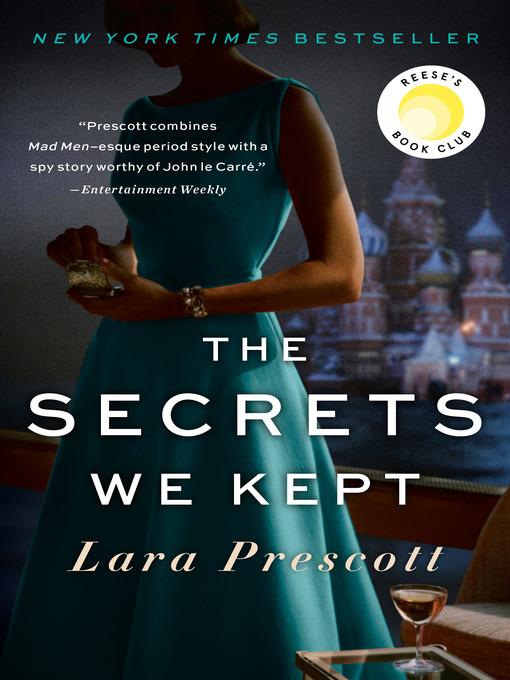
The Secrets We Kept
A novel
- اطلاعات
- نقد و بررسی
- دیدگاه کاربران
نقد و بررسی

Starred review from July 1, 2019
Prescott’s triumphant debut offers a fresh perspective on women employed by the CIA during the 1950s and their role in disseminating into the Soviet Union copies of Dr. Zhivago, Boris Pasternak’s banned masterpiece. In 1956, American-born Irina Drozdova gets a job at the CIA ostensibly as a typist but is destined for fieldwork. Former OSS agent Sally Forrester trains Irina in spycraft. Meanwhile, inside the Soviet Union, Boris Pasternak’s lover, Olga Vsevolodovna, is interrogated about Pasternak’s work in progress, Dr. Zhivago. After three years in a prison camp, she reunites with Pasternak, who, unable to publish in the Soviet Union, entrusts his novel to an Italian publisher’s representative. Back in Washington, Irina, now engaged to a male agent but in love with Sally, seeks assignment overseas. Dressed as a nun, she places copies of Dr. Zhivago, printed in the original Russian for the CIA, into the hands of Soviet citizens visiting the Vienna World’s Fair. Through lucid images and vibrant storytelling, Prescott creates an edgy postfeminist vision of the Cold War, encompassing Sputnik to glasnost, typing pool to gulag, for a smart, lively page-turner. This debut shines as spy story, publication thriller, and historical romance with a twist. 200,000-copy announced first printing.

July 1, 2019
Inspired by the true story of the role of Dr. Zhivago in the Cold War: a novel of espionage in the West, resistance in the East, and grand passions on both sides. "We typed a hundred words a minute and never missed a syllable....Our fingers flew across the keys. Our clacking was constant. We'd pause only to answer the phone or to take a drag of a cigarette; some of us managed to master both without missing a beat." Prescott's debut features three individual heroines and one collective one--the typing pool at the Agency (the then relatively new CIA), which acts as a smart, snappy Greek chorus as the action of the novel progresses, also providing delightful description and commentary on D.C. life in the 1950s. The other three are Irina, a young Russian American who is hired despite her slow typing because other tasks are planned for her; Sally, an experienced spy who is charged with training Irina and ends up falling madly in love with her; and Olga, the real-life mistress of Boris Pasternak, whose devotion to the married author sent her twice to the gulag and dwarfed everything else in her life, including her two children. Well-researched and cleverly constructed, the novel shifts back and forth between the Soviet Union and Washington, beginning with Olga's first arrest in 1949--"When the men in the black suits came, my daughter offered them tea"--and moving through the smuggling of the Soviet-suppressed manuscript of Dr. Zhivago out of Russia all the way up to the release of the film version in 1965. Despite the passionate avowals and heroics, the love affair of Olga and Boris never quite catches fire. But the Western portions of the book--the D.C. gossip, the details of spy training, and the lesbian affair--really sing. An intriguing and little-known chapter of literary history is brought to life with brio.
COPYRIGHT(2019) Kirkus Reviews, ALL RIGHTS RESERVED.

Starred review from August 1, 2019
DEBUT Boris Pasternak's masterpiece, Doctor Zhivago, banned in the Soviet Union, was smuggled out to an Italian publisher in 1957, when the book became a literary sensation in the West. In the United States, the work became a propaganda tool for the CIA. Prescott's exciting novel begins with the women who work in the agency's typing pool. Among these "gals" in Washington ("The West") are the young Russian American Irina and the sophisticated Sally, whose secretarial careers have turned into something a great deal more dangerous. Back in Moscow ("The East"), historical characters include Pasternak himself and his longtime lover Olga, the inspiration for Lara in his novel. Olga pays the highest price, spending years in the Gulag, a reminder of just how grim the Soviet years were. This rich and well-researched narrative has an almost epic sweep, with alternating dramatic plots involving spies and espionage, many fascinating characters (both historical and fictional) from East and West, and a gifted writer and storyteller to tie it all together. VERDICT For a debut novelist, Prescott writes with astonishing assurance, enthralling readers with tales of secret agents and intrigue, love, and betrayal. Highly recommended. [See Prepub Alert, 3/4/19.]--Leslie Patterson, Rehoboth, MA
Copyright 2019 Library Journal, LLC Used with permission.

Starred review from August 1, 2019
Spy stories offer high reader appeal, and Prescott's debut far surpasses the typical genre fare. In her novel, set during the post-WWII Cold War era, East seldom meets West, but events in each influence the other deeply. Through extensive research, Prescott artfully illuminates the CIA's role in helping disseminate the Soviet-banned Doctor Zhivago by Boris Pasternak. That novel, smuggled into and printed in Italy, found wide acclaim and earned its author a Nobel Prize. Meanwhile, as the Soviets launch satellites and chase scientific discoveries, the CIA takes a literary approach, choosing to change hearts and minds with literature. To that end, they trained women to deliver messages and ferret secrets from powerful men. Two such woman are Irina, an American with deep ties to Russia, and beautiful, mysterious Sally; both women have secrets of their own to conceal. Prescott, herself named after Doctor Zhivago's heroine, does a masterful job of spanning continents and juggling shifting points of view, but readers may wish to keep notes to remember who's who. Cold War buffs or those familiar with Pasternak's tour-de-force and its adaptations will find this book especially enticing. Those new to the story will still be intrigued, and perhaps want to seek out the original.(Reprinted with permission of Booklist, copyright 2019, American Library Association.)




دیدگاه کاربران